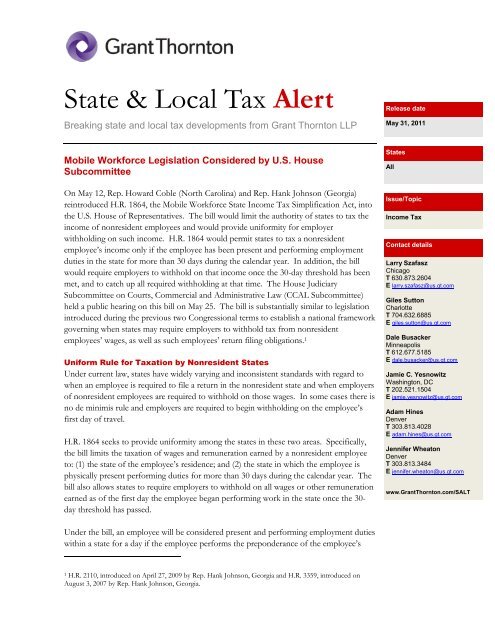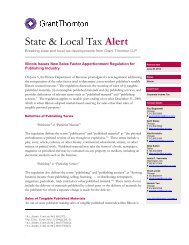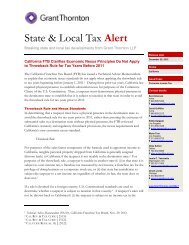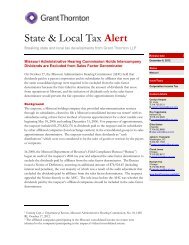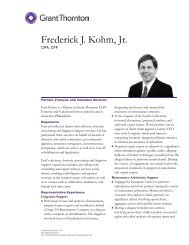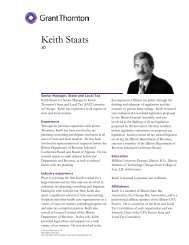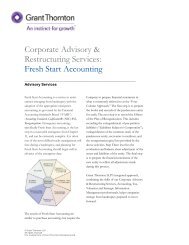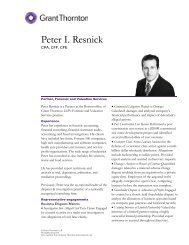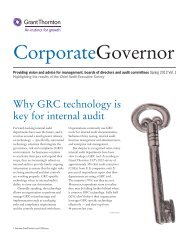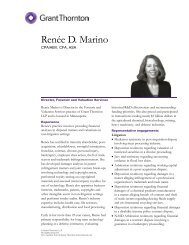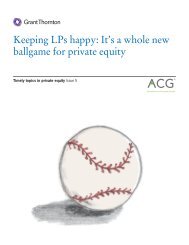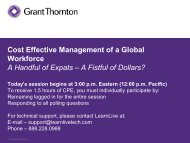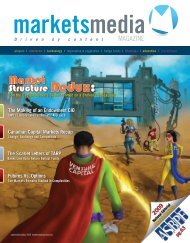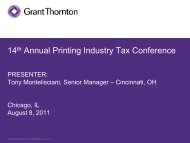State & Local Tax Alert - Grant Thornton LLP
State & Local Tax Alert - Grant Thornton LLP
State & Local Tax Alert - Grant Thornton LLP
You also want an ePaper? Increase the reach of your titles
YUMPU automatically turns print PDFs into web optimized ePapers that Google loves.
<strong>State</strong> & <strong>Local</strong> <strong>Tax</strong> <strong>Alert</strong><br />
Breaking state and local tax developments from <strong>Grant</strong> <strong>Thornton</strong> <strong>LLP</strong><br />
Release date<br />
May 31, 2011<br />
Mobile Workforce Legislation Considered by U.S. House<br />
Subcommittee<br />
On May 12, Rep. Howard Coble (North Carolina) and Rep. Hank Johnson (Georgia)<br />
reintroduced H.R. 1864, the Mobile Workforce <strong>State</strong> Income <strong>Tax</strong> Simplification Act, into<br />
the U.S. House of Representatives. The bill would limit the authority of states to tax the<br />
income of nonresident employees and would provide uniformity for employer<br />
withholding on such income. H.R. 1864 would permit states to tax a nonresident<br />
employee’s income only if the employee has been present and performing employment<br />
duties in the state for more than 30 days during the calendar year. In addition, the bill<br />
would require employers to withhold on that income once the 30-day threshold has been<br />
met, and to catch up all required withholding at that time. The House Judiciary<br />
Subcommittee on Courts, Commercial and Administrative Law (CCAL Subcommittee)<br />
held a public hearing on this bill on May 25. The bill is substantially similar to legislation<br />
introduced during the previous two Congressional terms to establish a national framework<br />
governing when states may require employers to withhold tax from nonresident<br />
employees’ wages, as well as such employees’ return filing obligations. 1<br />
Uniform Rule for <strong>Tax</strong>ation by Nonresident <strong>State</strong>s<br />
Under current law, states have widely varying and inconsistent standards with regard to<br />
when an employee is required to file a return in the nonresident state and when employers<br />
of nonresident employees are required to withhold on those wages. In some cases there is<br />
no de minimis rule and employers are required to begin withholding on the employee’s<br />
first day of travel.<br />
H.R. 1864 seeks to provide uniformity among the states in these two areas. Specifically,<br />
the bill limits the taxation of wages and remuneration earned by a nonresident employee<br />
to: (1) the state of the employee’s residence; and (2) the state in which the employee is<br />
physically present performing duties for more than 30 days during the calendar year. The<br />
bill also allows states to require employers to withhold on all wages or other remuneration<br />
earned as of the first day the employee began performing work in the state once the 30-<br />
day threshold has passed.<br />
<strong>State</strong>s<br />
All<br />
Issue/Topic<br />
Income <strong>Tax</strong><br />
Contact details<br />
Larry Szafasz<br />
Chicago<br />
T 630.873.2604<br />
E larry.szafasz@us.gt.com<br />
Giles Sutton<br />
Charlotte<br />
T 704.632.6885<br />
E giles.sutton@us.gt.com<br />
Dale Busacker<br />
Minneapolis<br />
T 612.677.5185<br />
E dale.busacker@us.gt.com<br />
Jamie C. Yesnowitz<br />
Washington, DC<br />
T 202.521.1504<br />
E jamie.yesnowitz@us.gt.com<br />
Adam Hines<br />
Denver<br />
T 303.813.4028<br />
E adam.hines@us.gt.com<br />
Jennifer Wheaton<br />
Denver<br />
T 303.813.3484<br />
E jennifer.wheaton@us.gt.com<br />
www.<strong>Grant</strong><strong>Thornton</strong>.com/SALT<br />
Under the bill, an employee will be considered present and performing employment duties<br />
within a state for a day if the employee performs the preponderance of the employee’s<br />
1 H.R. 2110, introduced on April 27, 2009 by Rep. Hank Johnson, Georgia and H.R. 3359, introduced on<br />
August 3, 2007 by Rep. Hank Johnson, Georgia.
<strong>Grant</strong> <strong>Thornton</strong> <strong>LLP</strong> - 2<br />
duties within such state for such day. Where an employee is present and performs<br />
material employment duties in both the resident state and one nonresident state on the<br />
same day, such employee will be considered to have performed the preponderance of their<br />
duties for that day in the nonresident state. The portion of a day that an employee spends<br />
in a state while in transit is not considered in determining the location where an employee<br />
performed employment duties.<br />
Employers may rely on the employee’s determination of time expected to be spent in a<br />
nonresident state absent knowledge of fraud or collusion between the employer and<br />
employee. If an employer, at its discretion, maintains a time and attendance system<br />
tracking the location where an employee performs their services on a daily basis, the data<br />
from such system will be used instead of the employee’s determination.<br />
Exclusions from the Uniform Rule<br />
The types of employees that are excluded from the uniform rules provided in the bill that<br />
would apply for withholding and income tax return filing obligations remains unchanged<br />
from the previous bills and applies to a limited number of employees who are athletes,<br />
professional entertainers, or certain public figures who give speeches or make similar type<br />
appearances and are paid on an per-event basis. The terms “employee” and “wages or<br />
other remuneration” will be defined by the state in which the duties are deemed to be<br />
performed.<br />
Effective Date<br />
The bill would become effective on January 1, 2013.<br />
CCAL Subcommittee Hearing<br />
As noted above, on May 25, the CCAL Subcommittee held a hearing to discuss the mobile<br />
workforce bill, at which three witnesses testified: Jeffrey Porter (on behalf of the American<br />
Institute of Certified Public Accountants (AICPA)), Joseph Crosby (on behalf of the<br />
Council on <strong>State</strong> <strong>Tax</strong>ation (COST)) and Patrick Carter (on behalf of the Federation of <strong>Tax</strong><br />
Administrators (FTA)). The AICPA and COST representatives supported adoption of<br />
the bill, though the AICPA representative noted that the bill should be revised to ensure<br />
that to the extent the 30-day threshold is passed, withholding and taxability should only<br />
apply prospectively, rather than retroactively to the entire initial 30-day period.<br />
In contrast, the FTA representative opposed the bill in its current format, noting that<br />
recordkeeping requirements contained in the bill needed to be strengthened, and there<br />
would be a substantial revenue impact on New York <strong>State</strong> due to the nature of its role as<br />
the center of finance and business that draws nonresidents to work in that jurisdiction.<br />
Further, the FTA representative requested that the definition of the word “day” be<br />
changed to all or any part of a day in which an employee provides services, and the list of<br />
employees excluded from the effect of the bill be expanded to those that are paid on a<br />
“per event” basis.
<strong>Grant</strong> <strong>Thornton</strong> <strong>LLP</strong> - 3<br />
Following their testimony, lawmakers addressed the vast majority of questions to the<br />
COST and FTA representatives. In the question and answer session, the FTA noted that<br />
the current system creates administrative burdens for all types of businesses, not just small<br />
businesses. With respect to reciprocity agreements that exist between some border states<br />
that completely eliminate nonresident withholding and taxation issues, the COST<br />
representative confirmed that such agreements would be left undisturbed by the proposed<br />
bill. The COST representative also noted that a bill of this nature would not be<br />
threatened by potential dormant Commerce Clause issues, and that keeping the status quo<br />
would ultimately deter interstate business activity as employers could restrict travel into<br />
jurisdictions requiring day one withholding on employees’ wages. Members of the CCAL<br />
Subcommittee inquired as to whether there was any flexibility on the 30-day threshold.<br />
While the FTA representative would like to see the threshold reduced, the COST<br />
representative noted that the 30-day threshold was the product of a compromise, as earlier<br />
versions of the bill initially set a 60-day standard, and that reducing the threshold further<br />
would mean that fewer people benefit from the proposed rule.<br />
Commentary<br />
<strong>State</strong> laws often provide for disparate treatment with respect to the taxation of income<br />
earned by a nonresident employee for work performed in the nonresident state, as well as<br />
the requirements imposed on the employer to withhold on that income. The uncertainty<br />
and inconsistency among states results in a significant administrative burden on multistate<br />
employers and on the conduct of interstate commerce. In certain instances, the lack of<br />
uniformity of state laws governing withholding of a nonresident employee’s state income<br />
tax can also lead to double taxation. For example, an employer can be required to<br />
withhold income tax in two states for the same days of work because any part of a day<br />
spent working in each state may count as a working day. 2 While in many cases a credit is<br />
available on the employee’s resident income tax return to ensure that the employee<br />
ultimately is taxed by only one jurisdiction, the employee may need to wait until the next<br />
calendar year to actually receive the benefit from the credit. Further, there are many<br />
instances where an employee residing in a state with no income tax works in states that<br />
impose income taxes. In this scenario, the employee does not receive a credit from the<br />
resident state for nonresident taxes paid.<br />
The Multistate <strong>Tax</strong> Commission (MTC) drafted a model statute aimed at promoting<br />
consistent employer withholding thresholds and exclusion for employee’s personal income<br />
tax obligation. The MTC used a 20-day threshold for taxability and withholding<br />
obligations. Adoption of the model statute by MTC’s member states, however, is not<br />
mandatory and would not guarantee a uniform standard of state taxation of nonresident<br />
employee income, particularly as the federal proposal would require a 30-day taxability and<br />
withholding threshold. At the CCAL Subcommittee hearing, the FTA representative<br />
stated that the MTC effort has helped to some extent, though there are some issues in that<br />
model statute that still need to be worked out, including the definition of a “day.” North<br />
2 For example, Connecticut and New York each require withholding for a single day’s visit. See New York<br />
Nonresident Audit Guidelines (March 31, 2009) and Connecticut Announcement No. 2010(3), Jan. 11, 2010.
<strong>Grant</strong> <strong>Thornton</strong> <strong>LLP</strong> - 4<br />
Dakota recently enacted legislation based on a draft of the MTC’s model statute and more<br />
states may enact similar legislation limiting the taxation of traveling employees. 3 During<br />
the CCAL Subcommittee hearing, the COST representative acknowledged the North<br />
Dakota bill but did not think that all states would act in concert to achieve uniformity in<br />
this area.<br />
Arguably, a meaningful federal statute must balance the states’ legitimate interest in raising<br />
revenue against the burdens that are imposed on multistate employers and employees.<br />
The goal of the proposed legislation is to promote consistent employer withholding<br />
thresholds and exclusion thresholds for the employee’s personal income tax obligations,<br />
increase overall compliance, and mitigate the burden on nonresident employees who<br />
temporarily perform work in several states.<br />
A bill concerning the imposition of state income taxes on nonresidents who temporarily<br />
work in a state has never been put to a Congressional vote, despite the vocal grievances<br />
expressed by the business community and state tax authorities. Although it is difficult to<br />
predict the probability of a vote on the current bill in light of these considerations, the fact<br />
that the bill is being co-sponsored in a bipartisan manner by members of the CCAL<br />
Subcommittee may raise the likelihood that the bill will at the very least, be passed by the<br />
CCAL Subcommittee and the Judiciary Committee, and be moved on to the full House of<br />
Representatives for consideration.<br />
The information contained herein is general in nature and based on authorities that are subject to change.<br />
It is not intended and should not be construed as legal, accounting or tax advice or opinion provided by<br />
<strong>Grant</strong> <strong>Thornton</strong> <strong>LLP</strong> to the reader. This material may not be applicable to or suitable for specific<br />
circumstances or needs and may require consideration of nontax and other tax factors. Contact <strong>Grant</strong><br />
<strong>Thornton</strong> <strong>LLP</strong> or other tax professionals prior to taking any action based upon this information. <strong>Grant</strong><br />
<strong>Thornton</strong> <strong>LLP</strong> assumes no obligation to inform the reader of any changes in tax laws or other factors that<br />
could affect information contained herein. No part of this document may be reproduced, retransmitted or<br />
otherwise redistributed in any form or by any means, electronic or mechanical, including by photocopying,<br />
facsimile transmission, recording, re-keying or using any information storage and retrieval system without<br />
written permission from <strong>Grant</strong> <strong>Thornton</strong> <strong>LLP</strong>.<br />
3 North Dakota S.B. 2170, Laws 2011.
<strong>Grant</strong> <strong>Thornton</strong> <strong>LLP</strong> - 5<br />
<strong>Tax</strong> professional standards statement<br />
This document supports the marketing of professional services by <strong>Grant</strong> <strong>Thornton</strong> <strong>LLP</strong>. It is<br />
not written tax advice directed at the particular facts and circumstances of any person. Persons<br />
interested in the subject of this document should contact <strong>Grant</strong> <strong>Thornton</strong> or their tax advisor<br />
to discuss the potential application of this subject matter to their particular facts and<br />
circumstances. Nothing herein shall be construed as imposing a limitation on any person from<br />
disclosing the tax treatment or tax structure of any matter addressed. To the extent this<br />
document may be considered written tax advice, in accordance with applicable professional<br />
regulations, unless expressly stated otherwise, any written advice contained in, forwarded with,<br />
or attached to this document is not intended or written by <strong>Grant</strong> <strong>Thornton</strong> <strong>LLP</strong> to be used,<br />
and cannot be used, by any person for the purpose of avoiding any penalties that may be<br />
imposed under the Internal Revenue Code.


